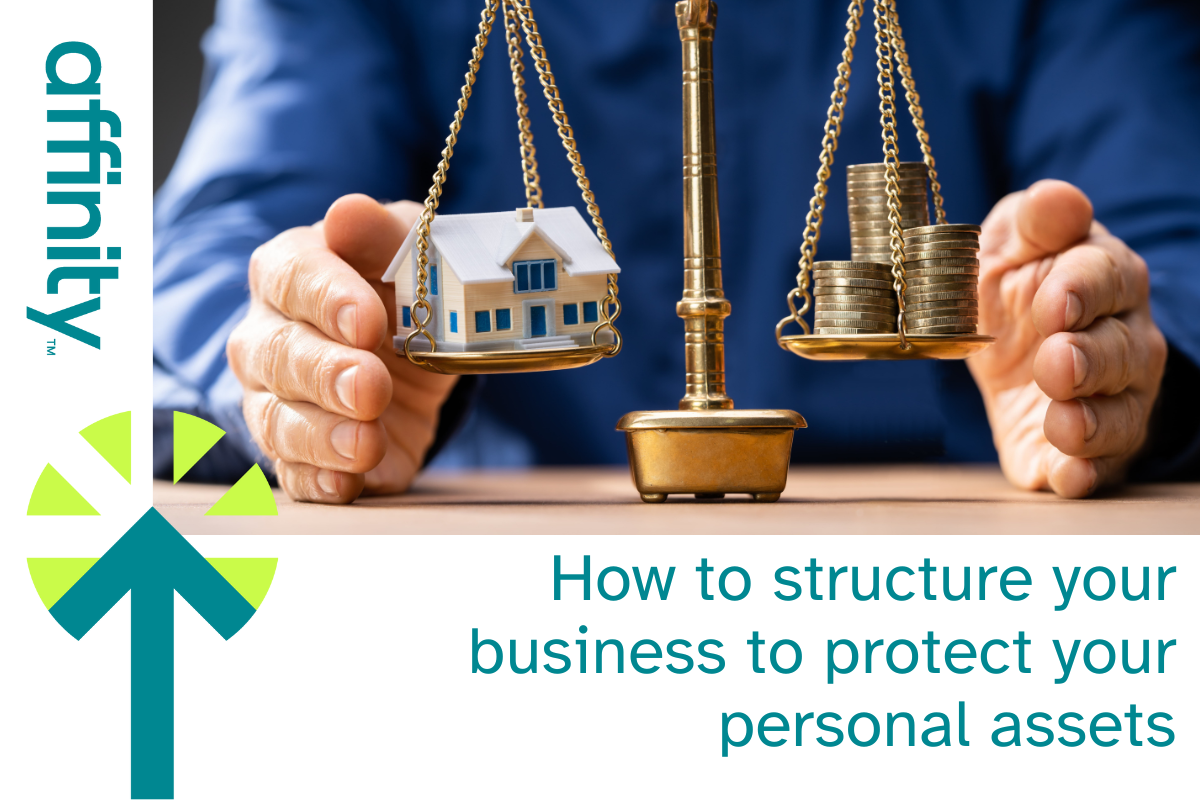How to structure your business to protect your personal assets
Starting or growing a business comes with both opportunity and risk. While it’s easy to get caught up in sales, branding, and day-to-day operations, one critical area that often gets overlooked is asset protection. Without the right structure, your personal savings, home, or other assets could be at risk if something goes wrong in your business.
Understand the risks you're exposed to
Before choosing a structure, you need to understand the types of risks your business could face so you can plan accordingly.
Actions:
· Identify any high-risk activities (e.g. physical products, advice-based services, or staff-related liabilities).
· Review your potential exposure to legal claims, unpaid debts, or contract disputes.
· Consider the personal guarantees you’ve made (e.g. for business loans or leases).
· Evaluate the impact of losing a major client or supply chain disruption.
· Think about what assets you want to shield such as home, savings, investments.
List your top three business risks and rank each one as low, medium, or high. This simple exercise gives you a clearer understanding of where you're most vulnerable and why having the right protections in place is essential.
Choose a legal structure with limited liability
The most effective first line of defence is structuring your business so that you and the business are legally separate.
Actions:
· Consider forming a limited liability company rather than operating as a sole trader or partnership.
· For existing sole traders or partnerships, speak to an advisor about transitioning to a company.
· Make sure your company is properly registered and maintained in good standing.
· Understand the difference between being a shareholder (owner) and a director (manager) as both carry different responsibilities.
· Avoid treating the company’s funds like your own and keep finances clearly separated.
If you’re currently operating as a sole trader or partnership, set up a consultation with an accountant or lawyer to explore company formation options.
Separate personal and business finances
Blurring the line between personal and business money not only causes tax and accounting issues, but it can also weaken your liability protection.
Actions:
· Open separate bank accounts and credit cards for your business.
· Pay yourself a regular salary or draw, rather than dipping into business funds.
· Avoid using personal funds to pay business debts unless absolutely necessary.
· Keep clear records and documentation of all transactions between you and the business.
· Use contracts and invoices under the business name, not your personal name.
If you haven’t already, open a dedicated business bank account and start running all income and expenses through it.
Use trusts or holding companies strategically
Advanced structures such as trusts or holding companies can offer an extra layer of protection, especially for growing businesses.
Actions:
· Consider holding valuable business assets (e.g. intellectual property, property, or equipment) in a separate entity.
· Explore using a family trust to hold your personal or business shares.
· Use a trading company for operations and a holding company for asset protection.
· Seek professional advice before setting up complex structures as they must be set up and maintained properly to be effective.
· Don’t assume a structure protects you without the right legal documentation in place.
Talk to a lawyer or accountant about whether your business would benefit from a trust or holding company structure based on your size, risk, and goals.
Protect yourself with contracts and insurance
Your legal structure helps, but it doesn’t replace the need for strong operational protections like contracts and insurance.
Actions:
· Use written contracts for all clients, suppliers, and team members.
· Avoid personal guarantees where possible, or negotiate limits.
· Make sure your terms and conditions are clear, legally sound, and up to date.
· Maintain adequate business insurance for public liability, professional indemnity, cyber, etc.
· Regularly review your policies and coverage with an advisor.
Review your current contracts and insurance policies. If it’s been over 12 months since you last updated them, schedule a legal and insurance review.
Final thoughts
Protecting your personal assets doesn’t happen by chance, it’s the result of smart decisions made early and reviewed regularly. By choosing the right structure, separating your finances, and using legal and insurance tools, you can run your business with greater peace of mind and confidence.
Don’t wait for something to go wrong before acting, set up strong protections now, and you’ll thank yourself later.
If you’d like tailored advice on safeguarding your assets and setting up the right protections, our Wellington accounting and business advisory team is here to help. Let’s put the right strategies in place so you can focus on running your business with confidence.
What our clients say
“They are great! They were extremely professional and everything was made very simple to me.”
-German Molina Larrain


